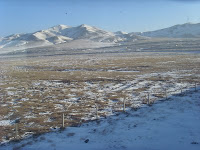














After passing through Irkusk, which is one of Russia's largest logging areas, there many large rivers which are used to transport logs. Scenically it is an impressive area as the train constantly crosses, descends and climbs many rivers and ravines. Lake Baikal is set in most beautiful countryside. It is the deepest lake in the world and contains 20% of its fresh water supply. Furthermore it happens to be the oldest lake, its water is particularly high in oxygen. it is about 400 miles long by about 30 miles wide. Incredibly the water is quite safe to drink, owing to sponges that live in its depths, along with many other hundreds of other species found nowhere else.
The track follows the lake side for about 100 miles, then it turns south and stays in that direction till reaching Beijing. The scenery starts changing to rolling green hills.
The Russian border with Mongolia is staffed with cold and officious Russians, who make me feel quite uneasy, in contrast the Mongolians are efficient and far less severe in manner. An elaborately carved dining car was connected, this was staffed by pink cheeked, Mongolian ladies, with warm, brown, smiling eyes. In contrast to the morose and obese ladies we left behind on the other side of the border along with their kitchy dining car.
Ulan Bator is booming, squat and scruffy. Black marketeers flood the train. I bought some Mongolian currency, fortunately just enough for a meal, only to find later that i had only got half the official exchange rate. The temperature was well below freezing in the treeless expanse, which is what you would expect in the world's coldest capital.
The Gobi is not a Sahara type sand desert, but rather, rolling, grassy steppe, where the blades of grass were thin and wire like. Impressively empty, with an occasional collection of yurts and grazing horses and the occasional camel. later i was to meet some Germans who had had a dream of living in a yurt and riding noble steeds in the desert, the reality was that they froze in the yurts and that the horses were nags.
Its delicate habitat could suffer irreversibly by the mining of the vast underground resources which include, gold, coal, copper, magnesium, uranium, etc. Bidding wars are taking place for concessions which will wreak havoc on the delicate environment.
Erelun is the Mongolian-Chinese border. Here a remarkable feat took place beneath my feet. The Russian rail gauge is 5 feet wide, the Chinese is 3.5 " less. Giant hydraulic jacks raise the carriages, then the bogies are pushed away, at the same time a train proceeding in the other direction sheds its wheels and both trains swap wheels and then move off in opposite directions.
The Chinese customs and immigration were ultra efficient, like a gymnast at the Olympics.


No comments:
Post a Comment